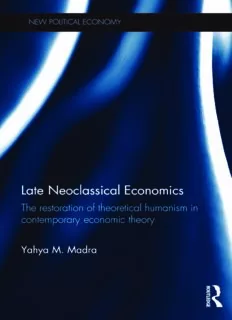
Late Neoclassical Economics: The restoration of theoretical humanism in contemporary economic theory PDF
Preview Late Neoclassical Economics: The restoration of theoretical humanism in contemporary economic theory
Late Neoclassical Economics Several contemporary economic theories revolve around different concepts: market failures, institutions, transaction costs, information asymmetries, motivational diversity, cognitive limitations, strategic behaviors, and evolutionary stability. In recent years, many economists have argued that the increase in circulation and mobilization of these new and heterogeneous concepts and their associated methodologies (e.g., experiments, evolutionary modeling, simulations) signify the death of neoclassical economics. Late Neoclassical Economics: the restoration of theoretical humanism in contemporary economic theory draws on the work of Louis Althusser, Michel Foucault, and the Amherst School, and reconstructs the concept of a self-transparent and self-conscious human subject (Homo economicus) as the theoretical humanist core of the neoclassical tradition. Instead of identifying the emergent heterogeneity as a break from neoclassicism, this book offers a careful genealogy of many of the new concepts and approaches—including evolutionary game theory, experimental economics, and behavioral economics—and reads their elaboration as part of the restoration of the theoretical humanist core of the tradition in response to its drift towards structuralism. This book is suitable for those who study political economy, history of economic thought, and philosophy of economics. The arguments put forward in this text will also resonate with anyone who is interested in the fate of the neoclassical tradition and the future of economic theory. Yahya M. Madra teaches Economics at Boğaziçi University, Istanbul, Turkey. He has published and co-authored articles on various issues in political economy in both edited book volumes and journals. New Political Economy Richard McIntyre, General Editor For a complete list of titles in this series, please visit www.routledge.com/series/ TFSE00174 9 New Deal Banking Reforms and Keynesian Welfare State Capitalism Ellen D. Russell 10 Rethinking Municipal Privatization Oliver D. Cooke 11 The Political Economy of European Union Competition Policy A case study of the telecommunications industry Tuna Baskoy 12 Labor, Industry, and Regulation during the Progressive Era Daniel E. Saros 13 Discipline in the Global Economy? Jakob Vestergaard 14 Unions and Class Transformation The case of the Broadway musicians Catherine P. Mulder 15 Worker Identity, Agency and Economic Development Women’s empowerment in the Indian informal economy Elizabeth Hill 16 Seeking Sustainability On the prospect of an ecological liberalism G.J. Paton 17 Class, Gender, and the American Family Farm in the 20th Century Elizabeth Ramey 18 Late Neoclassical Economics The restoration of theoretical humanism in contemporary economic theory Yahya M. Madra Late Neoclassical Economics The restoration of theoretical humanism in contemporary economic theory Yahya M. Madra First published 2017 by Routledge 2 Park Square, Milton Park, Abingdon, Oxon OX14 4RN and by Routledge 711 Third Avenue, New York, NY 10017 Routledge is an imprint of the Taylor & Francis Group, an informa business © 2017 Yahya M. Madra The right of Yahya M. Madra to be identified as author of this work has been asserted by him in accordance with sections 77 and 78 of the Copyright, Designs and Patents Act 1988. All rights reserved. No part of this book may be reprinted or reproduced or utilised in any form or by any electronic, mechanical, or other means, now known or hereafter invented, including photocopying and recording, or in any information storage or retrieval system, without permission in writing from the publishers. Trademark notice: Product or corporate names may be trademarks or registered trademarks, and are used only for identification and explanation without intent to infringe. British Library Cataloguing in Publication Data A catalogue record for this book is available from the British Library Library of Congress Cataloging in Publication Data Names: Madra, Yahya M., author. Title: Late neoclassical economics: the restoration of theoretical humanism in contemporary economic theory/Yahya M. Madra. Description: Abingdon, Oxon; New York, NY: Routledge, 2016. Identifiers: LCCN 2016002712 Subjects: LCSH: Neoclassical school of economics. Classification: LCC HB98.2.M33 2016 | DDC 330.15/7--dc23 LC record available at http://lccn.loc.gov/2016002712 ISBN: 978-0-415-73850-7 (hbk) ISBN: 978-1-315-81725-5 (ebk) Typeset in Times New Roman by Deanta Global Publishing Services, Chennai, India In memory of Stephen A. Resnick, 1938–2013 This page intentionally left blank Contents List of illustrations ix Acknowledgments x PART I Introduction 1 1 Introduction: making sense of an emergent heterogeneity 3 2 Towards an anti-essentialist Marxian critique of theoretical humanism 26 PART II Neoclassical economics: under the shadow of structuralism 43 3 Neoclassical economics: shedding “psychologism” 47 4 Theoretical humanism in crisis: the case of Walrasian economics in the post-war period 64 5 Theoretical humanism in the evolutionary mode: the case of the Chicago School in the post-war period 77 PART III Late neoclassical economics: restoration of theoretical humanism 87 6 Breaking with neoclassicism or restoring theoretical humanism? 91 7 Market failures and economic institutions: opening black boxes and introducing meta-markets 107 viii Contents 8 Motivational diversity and cognitive limitations: saving the human subject from its structuralist destitution 128 9 E quilibrium and efficiency: searching for social reconciliation in game theoretic contexts 150 PART IV Conclusion 173 10 Epilogue: the real divide in economics 175 Bibliography 183 Index 199 Illustrations Figure 9.1 A taxonomic outline 157 Tables 9.1 The invisible hand game 155 9.2 The assurance game 158 9.3 The prisoners’ dilemma game 159 9.4 The hawk and dove game 162 9.5 The disorder game 167
Description: